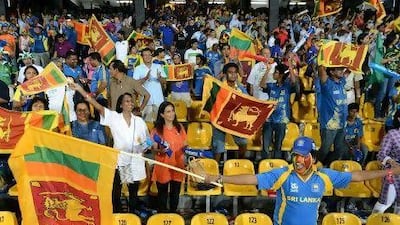A regular visitor to Sri Lanka came up with this gem to explain why he loves coming here.
Sri Lanka is, he said in Urdu, "subcontinent ka foreign he", meaning that, though geographically within the subcontinent, is outside of it like a foreign country in many other senses.
This captures the otherness of Sri Lanka to those from the subcontinent, where you can fly in thinking you are arriving in a familiar environment but know at once upon landing that you are not.
It is difficult to describe accurately this sensation, but maybe it is a little like expecting to drink tea and realising it has salt in it instead of sugar.
Bangladesh, India and Pakistan, though vastly different, still feel like they emerged from one weird experiment.
Sri Lanka is different chemistry altogether. So the World Twenty20, the first global cricket tournament Sri Lanka has hosted alone in a decade (since the Champions Trophy in 2002) and the first since the civil war ended, might come to be viewed as a unique event.
The nature, indeed the aim, of global events organised by a supranational body like the International Cricket Council (ICC) is to develop one identity that fits them all.
This is understandable for logistical and organisational purposes, but it can deaden a sense of the place. If you hang around one ICC tournament in Colombo, it can look and feel deceptively like another in Johannesburg.
Only occasionally the country breaks out. As an outsider the natural tendency is to place a country in neat, boxed contexts.
So in Sri Lanka, even if you don't seek it, it is still easy to get into conversations about the grimness of unforgotten conflict and of a different unrealised future and currently, of using sport toward that future.
It is much more complicated than that, but it's also so much easier.
"If you look at country and our background, two, three decades of war, we're happy and proud to say, after ending war, that in three years time we managed to hold two World Cups in Sri Lanka," says Nishantha Ranatunga, the secretary of Sri Lanka Cricket (SLC), a former player and part of one of the country's more illustrious cricket families.
It is complicated because building new stadiums for the 2011 World Cup and refurbishing existing ones bankrupted the SLC. And because the board, last year, was commonly thought to be among the most corrupt institutions in the country.
And that, in this endeavour, sport intractably gets mixed up with politics and we are not even remotely done answering the question of whether that is good, bad or just is.
It is through these tropes that cricket's hold in Sri Lanka can be identified within the rest of the subcontinent. There is great, overwhelming feeling for it here but not in the way of India, Pakistan and Bangladesh.
You do not sense danger in the stands here, of impending and uncontrolled joy and impending and uncontrolled anger.
Is this tournament having some intangible national effect? It is an easy question to answer but not definitively (one telecom operator thinks so: "Uniting one country's passion" it billboards).
Maybe though the answer might become clearer if Sri Lanka win the final tomorrow.
"I think all tournaments like this are a huge asset and have an effect on the host and more so as the country continues to progress," says Ranjit Fernando, a former cricketer and broadcaster.
"That has a huge value that you cannot measure in monetary terms. The 2011 World Cup was the first after peace returned but we were co-hosts and the final was elsewhere.
"This one has entertainment value and a huge effect. It has brought in new spectators. But also Sri Lanka has a lot to showcase the world now that peace has returned."
This line, then, is developing: we have to show the world, our sport can show the world. Deep in the very rural south, in Hambantota, the clearest picture is emerging of what Sri Lanka wants to show.
A modern deep sea port is being built with help from China. It is the home district of the president, Mahinda Rajapakse.
An international convention centre is almost ready and an international airport is. Villages and small towns are to be made over into a leading economic trading hub in South Asia.
Matches from two world cups have now been played there as well.
The region put in a serious bid for the 2018 Commonwealth Games, ultimately losing to the Gold Coast in Australia.
"It is disappointing of course that we will not see a Hambantota Games in 2018," the bid chairman Ajith Nivard Cabraal said at the time.
"But we have said all along that bidding for these prestigious Games is a key part of an exciting and progressive journey in Sri Lanka."
Another bid has not been ruled out.
Follow us
& Osman Samiuddin

